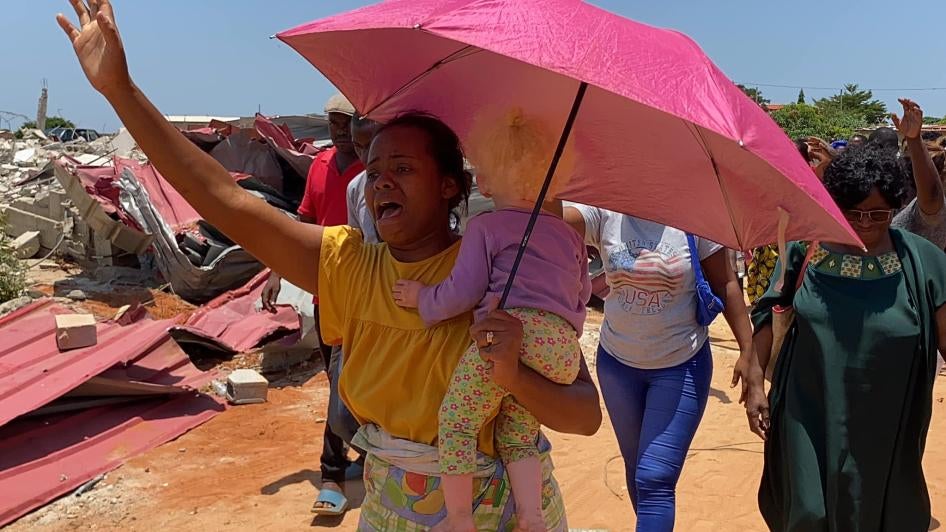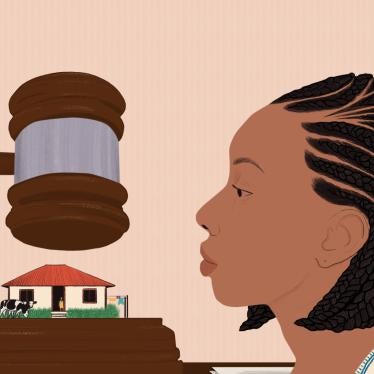(Johannesburg) – The Angolan authorities should immediately suspend forced evictions and demolitions in southern Luanda, Human Rights Watch said today. The government should also ensure that the owners of houses already demolished receive prompt reparations in the form of compensation, adequate relocation, and alternative accommodations.
Angolan security forces raided the capital’s Zango 3 area on February 27, 2023 and forcibly evicted people, then immediately demolished over 300 homes, leaving hundreds homeless. Residents said those who refused to abandon their houses or gathered to peacefully demonstrate against the security forces’ actions were beaten and arrested. Local authorities claimed the houses had been built illegally.
“The Angolan authorities should immediately halt all evictions and demolitions operations in Luanda that violate international legal standards,” said Ashwanee Budoo-Scholtz, deputy Africa director at Human Rights Watch. “Officials responsible for unlawful evictions and using excessive force against residents need to be held accountable.”
On February 27, a joint force of police and soldiers equipped with military assault rifles and batons arrived without warning between 7 a.m. and 8 a.m. in the Zango 3 area of the municipality of Viana, residents said. A man in police uniform whom residents described as the force commander used a megaphone to tell people to leave their homes, then ordered the driver of a bulldozer to destroy the houses. Residents said the security forces neither presented a court order nor introduce themselves or explain under whose orders they were acting.
“They surprised us when my wife and I were preparing to leave the house for work,” said Juliano, who did not want his full name used. “Until now [March 1] I don’t know who sent them here to destroy my house.” Juliano has lived in the neighborhood since 2020, and possesses the legal documents for the house, which the local Viana administration issued. He lived in the house with his wife and three children.
“I was still breastfeeding my baby in the bedroom when I heard the voice ordering us to leave the houses,” said Rosa, another resident. “Next thing, two soldiers broke the door of the house and started to remove my furniture, pots, clothes – everything – outside. When I tried to stop them, one of the soldiers slapped my face.”
Residents and two journalists who were covering the forced evictions said that police beat four men who tried to protect their properties and arrested dozens of others who had peacefully gathered to protest. The journalists alleged that the police and soldiers denied the media access to the area.
Human Rights Watch sought comment from the Angolan Police on February 28. A spokesman said he was not aware of any eviction and demolition operation in Viana. Later that day, the Viana Municipality Administration office issued a media statement confirming the operation. The local authority claimed that residents had illegally and “against warnings by the authorities” built houses in an area reserved for the construction of an electric power station for the Zango area. Furthermore, the eviction and demolition operation aimed at “clearing” the land that had been occupied by people “who through their actions… jeopardize the completion of projects that will benefit many families and accelerate the development of the country.”
Under international law, a “forced eviction” is “the permanent or temporary removal against their will of individuals, families and/or communities from the homes and/or land which they occupy, without the provision of, and access to, appropriate forms of legal or other protection.” Even when the government expropriation of land is lawful, the authorities need to apply minimum procedural protections, including genuine consultation with those affected; adequate and reasonable notice of the date of eviction; timely information on the proposed eviction; proper identification of the staff carrying out the eviction; and available legal remedies for those affected, including compensation and alternative housing.
Forced evictions have been a persistent problem in urban areas of Luanda since the end of the civil war in 2002. In 2007 Human Rights Watch and SOS Habitat published “‘They Pushed Down the Houses’: Forced Evictions and Insecurity of Tenure for Luanda’s Urban Poor,” which documents 18 mass evictions in Luanda between 2002 and 2006, affecting 20,000 people.
In 2016, forced evictions and demolitions in Zango II, Zango III and Walale, all in Viana municipality, left over 6,000 people homeless. In September 2018, Human Rights Watch visited the areas and found that the forcibly evicted residents were yet to be relocated and compensated. The authorities claimed that residents illegally occupied land reserved for state projects. The Luanda governor at the time, Adriano Mendes de Carvalho, admitted that the police and military had used force during evictions operations, and even described some of those confrontations as “truly terror scenes.”
The United Nations Committee on Economic, Social and Cultural Rights in 2016 expressed concerns regarding the repeated use of forced evictions in various Angolan cities, including from informal settlements and during development projects, without the necessary procedural guarantees, the provision of alternative housing, or adequate compensation to the affected people.
“The Angolan government needs to stop its longstanding, outrageous use of forced evictions,” Budoo-Scholtz said. “Any future eviction operations should be planned and carried out in a lawful and orderly way that respects people’s rights to housing, livelihoods and safety.”








